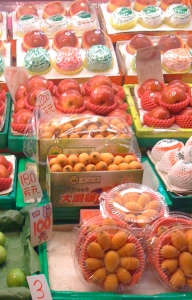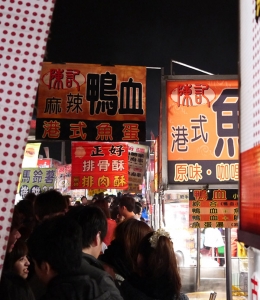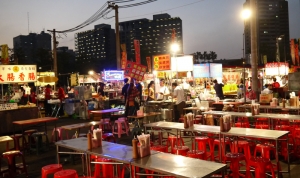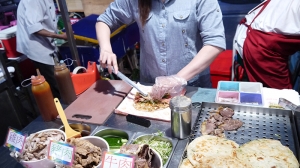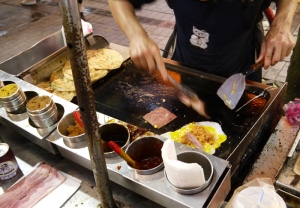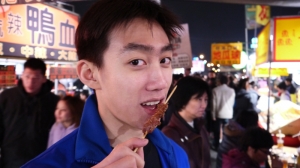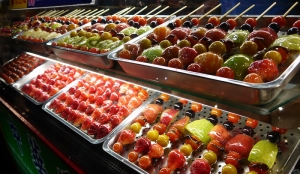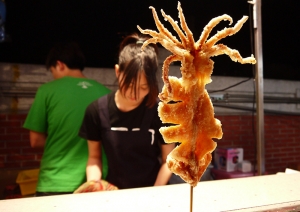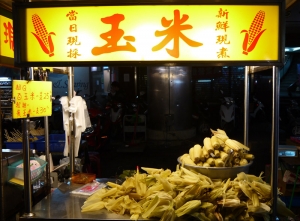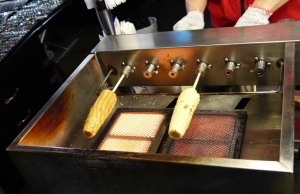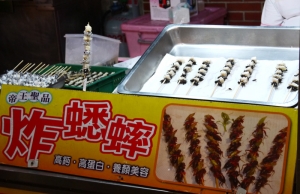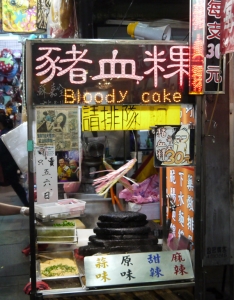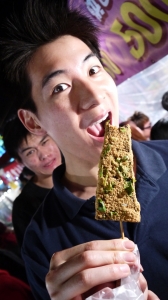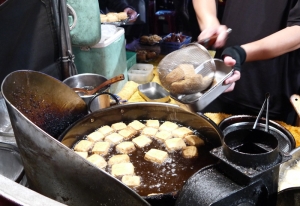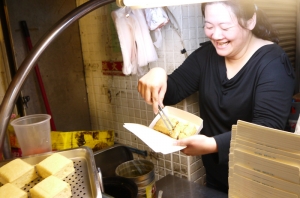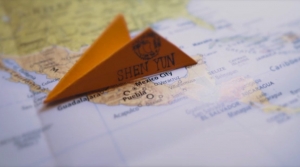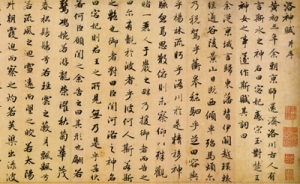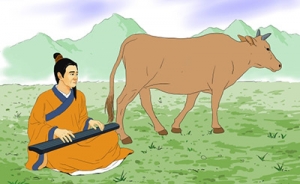Asian Food Review: Part 2
At last, Taiwan! The island of funky-tasting fruits, wrongly spelled designer brands, and most importantly—GREAT FOOD.
Taiwan is inhabited by, in my impression, the most bubbly and hospitable Asians who are also completely bananas about food. Last year, when our company arrived in Taiwan I saw on the street not only more motorcycles than cars, but also more restaurants than homes. In fact, there may have been more restaurants than motorcycles.
On most main roads, you find a bubble tea stall or snack stand every couple steps. In Taiwan, it’s easier to eat out than dine in, though for those foodies who turned their houses into restaurants, or restaurants into their homes, there is no difference.
The island of Formosa has a surprisingly diverse topography and climate for its size. Conveniently, this allows for a wide spectrum of produce, from high-mountain oolong tea down to seashore seafood. Conveniently, we got to try it all!
At every theater, the local organizers assembled a team of chefs backstage to cater just to us. We had delicious dishes before and after every show. But if you still got hungry late at night you could get McDonald’s delivered for free to your hotel door at prices much cheaper than in America. On rare no-show days, we headed out to the night-market, a place which also goes by this honorific title: FOOD HEAVEN.
Some may find Taiwan's night-markets smelly, noisy, crowded, or even… unsanitary (gasp). But for foodies like you and me, night-markets are the best places in the world. You never know what kind of weird and wonderful food you might discover there… everything from duck head to chicken butt.
Let’s take a look:
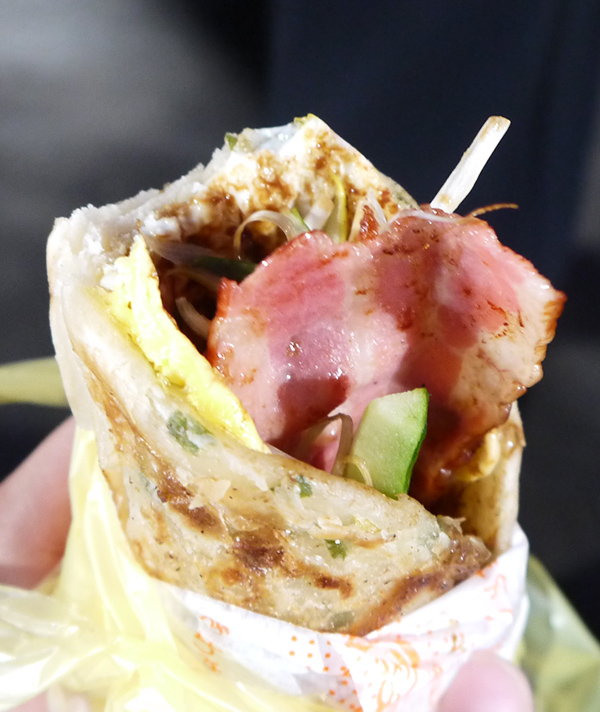
Scallion Pancake Roll
Just a regular pancake right? Wrong. It's congyoubing, and way more than just a pancake. It might just be the most delicious pancake you will ever taste—an ingeniously simple invention of Chinese cuisine. In my opinion, the scallion pancake roll is a piece of art, a perfectly balanced composition, harmonious texture, and lots of room for improvisation.
The pancake is made with chopped scallion embedded into dough that’s fried to a crispy golden brown before your eyes. A good pancake is flaky and crunchy on the outside but chewy on the inside. Then, like ordering at Subway, you can stand at the counter and customize your roll with endless combinations of fillings and sauces, making it a singular experience each time.
Take a look at this poster of a typical “house special” combo for only 45 NT ($1.50): Scallion pancake with grilled sausage, smoked bacon, cheesy corn, egg, basil… and that's only half the ingredients you can choose from!
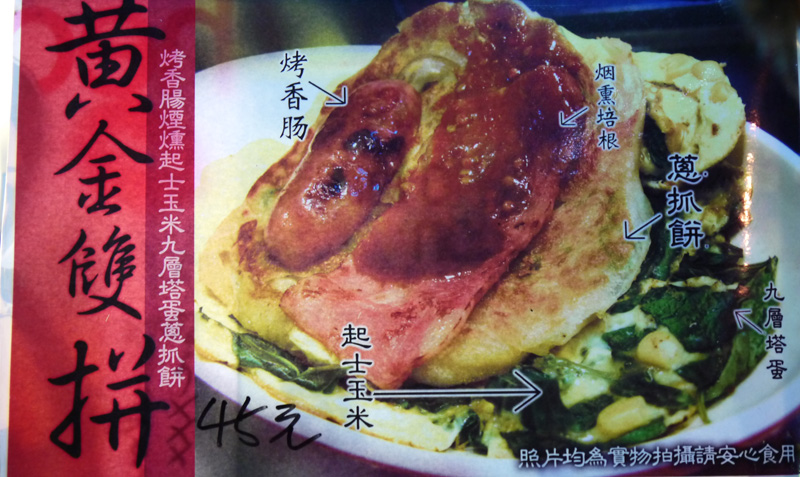
You could say it’s like a double whopper with cheese, but more filling (though not necessarily healthier). Scallion pancake also defeats Burger King, because you can "Have It Your Way™" even more—have you ever seen a burger that can contain squid, curry chicken, or condensed milk?
Skewered and Grilled
Lamb Kebab
It's curious to think that something invented by medieval Persian knights cooking chunks of sword-skewered meat over open fires has become a popular snack enjoyed all over the world.
Kebab, which may have been invented by the Mongolians, traveled to China from nomadic Turkic tribes to Uighurs in Xinjiang, and today can even be found at night-markets in Taiwan.
One vendor we visited had a sign claiming “Authentic Xinjiang Flavor,” and even had a picture of a chef at work—probably his manager—who was a bald Turkish-looking Chinese man with a moustache. We were given very generous portions of lamb, most likely imported from Australia or New Zealand. The chunks of meat were sprinkled with cumin and were much bigger and juicier than those from street-vendors in New York’s Chinatown.
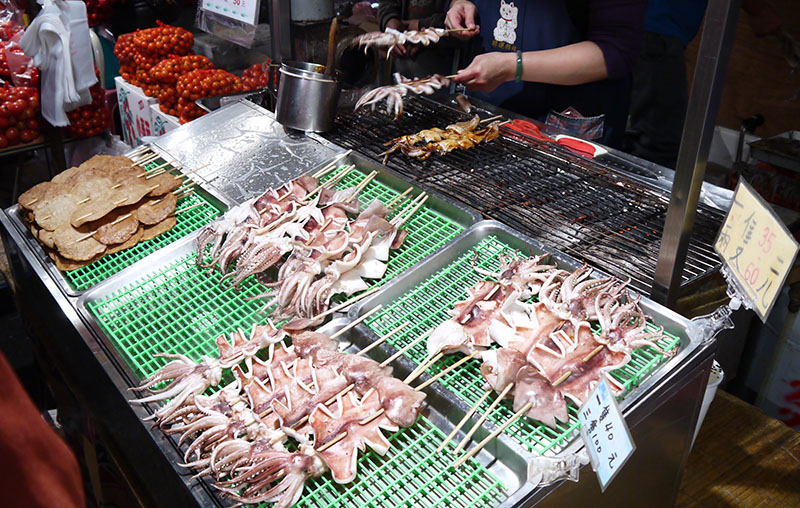
Squid
I don't know about other people, but East Asians love to eat their squid whole, though it might look a little scary. Squid is an excellent source of protein and having the whole thing on a skewer facilitates eating and walking at the same time… reducing the time needed to reach the next food stall.
Corn on the Cob
I know this corn is fresh because the sign says so: “Harvested on the same day and cooked fresh as you order.” The corn is actually boiled first before each cob is put on a self-turning grill to achieve the slightly burned, crispy coat. After a sprinkling of sesame, you can choose between a variety of flavors, including but not limited to: coconut, seaweed, satay, and BBQ.
Cricket
This is the only thing I didn't try… not because I was too faint-hearted or anything, of course not… but because I had two bags of food in one hand and a bubble tea in another. However, I'm sure Korean beondegi addicts would not hesitate a moment to try this. And why wouldn't they—cricket is “high in calcium, high in protein, and beautifies facial skin,” so I’m told.
A fellow dancer who grew up in Taiwan told me that he once saw a cooking show on TV explaining how to fry cockroaches, and why red cockroaches taste better than black ones…
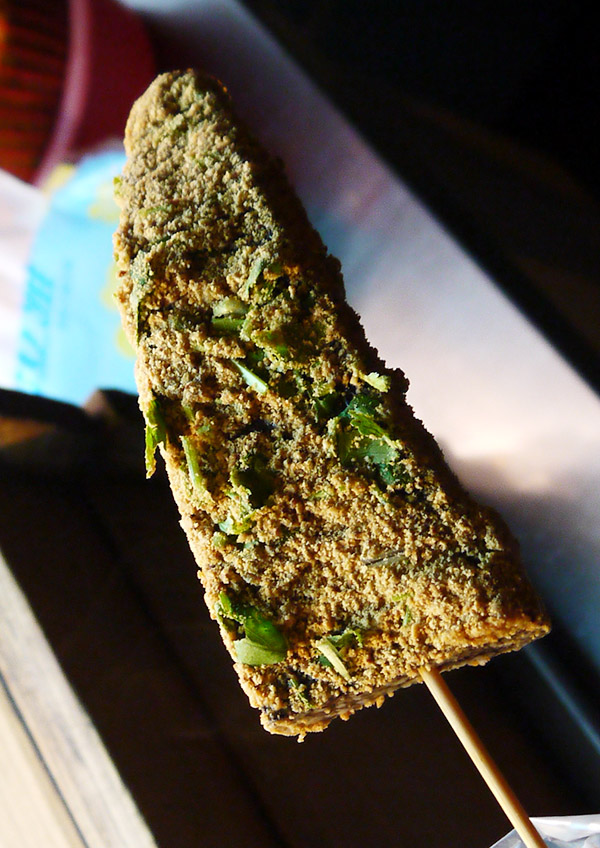
Steamed Bloody Cake
One day, I was absentmindedly watching Taiwanese news when something caught my attention: a huge line of anxious customers waiting behind a tiny stall for their number to be called.
This, apparently, was not breaking news but a daily phenomenon at Taipei’s Shilin night market. A reporter approached these people to ask them what they were waiting for. “My friend told me it’s the best thing ever.” “I’ve been waiting 30 minutes in line just to get this bloody cake.” “I have to try this bloody cake before I die.”
It really is called "Bloody Cake", although for speakers of British English, the word "Bloody" is more of a crude exclamation than an adjective.
The idea of eating something soaked in blood sounded a little vampirish, but I was intrigued. What was this bloody cake? I made a note to try one before I left Taiwan. At the last night-market we went to, in Taoyuan, I did.
I ordered the most popular kind—cake steamed in pig blood, with the most standard garnish—peanut powder and Chinese parsley. Honestly, I was disappointed. It had no taste. It was just a sticky rice cake with a hint of peanut and parsley. I barely tasted blood.
I guess I was still a little culturally insensitive, and had yet to appreciate the bloody cake for its historical gravitas.
You might have heard of the Chinese saying: Northerners love their noodles, Southerners love their rice. And it was immigrants from the southern province of Fujian who crossed the strait and brought their affection for rice snacks to Taiwan.
Where does the blood come in? In ancient China, farm animals were killed mainly as sacrifices to the heavens. During the rest of the year, meat was a rare treat, especially during times of poverty. So people began saving the highly nutritious blood from slaughtered pigs and ducks to put in soup or steam into rice.
Over time, pig’s blood became popular, being cheaper than duck’s. The first Taiwanese blood cake is said to have originated after WWII at a Taipei slaughterhouse, where people arrived early to ask for pig blood before it was dumped.
It is indeed during times of hardship that the best dishes are invented. Or is it because everything tastes better when you’re hungry?
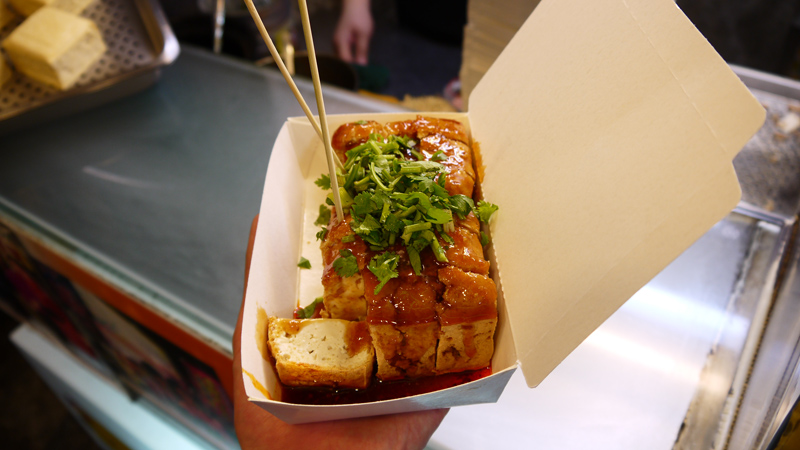
The One and Only… Stinky Tofu
Stinky tofu was an accidental invention, or should I say, “discovery,” in the same kind of sense that blue cheese was probably “discovered.” Someone forgot bean curd in a jar for too long until it turned green and stinky.
That someone was Wang Zhihe, a Qing Dynasty scholar. After failing the imperial examinations, he decided to stay in Beijing and sell tofu. Little did he know that he would leave for posterity a contribution to Chinese culture in the form of his stinky invention.
Here are my 12 Steps to Stinky Tofu:
1. Wait until you’re really, really hungry.
2. Go to a night-market with friend A, who loves stinky tofu, and friend B, who abhors it.
3. Keep your eyes open for swarms of hungry stinky tofu aficionados.
4. Rely more on your nose, because before seeing it you will scent it first.
5. If friend B gasps in disgust convinced that the smell is coming from a garbage dump, while friend A believes it could be the best stinky tofu in town, you're on the right track.
6. You may need to follow that smell for some time before you spot a line of drooling fans.
7. Make sure it’s deep-fried crispy-skin stinky tofu—those are the best.
8. Make sure it's as stinky as the sign claims. Some stinky tofus are so smelly that vendors have to install an exhaust hood to vent toxic fumes into something like a trash can.
9. If you followed Steps 4-8, BINGO! Congratulate yourself for finding the Smelly Grail.
10. Don’t haggle. I wouldn't, not now, because you’re getting a priceless luxury so cheap!
11. Make sure you ask for pickled vegetables, hot sauce and sprinkled parsley.
12. Chew slowly. Let it rock the taste bud party in your mouth. Make satisfied noises. Take pictures. Savor the moment. Share with friend A. Wave the stinky tofu in friend B’s face. Immerse yourself in the smelly experience.
Remember the golden rule: The stinkier, the better.
This formula can also be expressed in an Equation of Smellativity: As smelliness increases, taste and enjoyableness increase proportionally. To infinity.
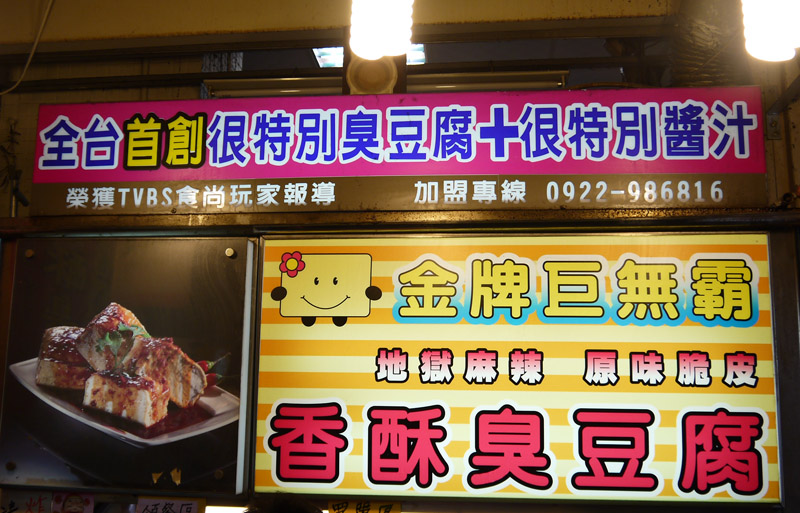
Postscript
While Chinese people may find it hard to understand the passion Koreans have for steamed baby silkworms, others may find it equally hard to comprehend our stink-mania.
It is my view that with all those disgusting-but-addicting snacks, you either love’m or hate’m. And I must confess, with all due respect to my mom, there’s nothing I love more than stinky tofu—it's the best thing that’s ever happened to me.
I hereby solemnly vow to love and cherish stinky tofu, for smellier or worse, with all my heart and stomach, for as long as I live. (Till death or indigestion do us part.)
Every year in Taiwan we dance to the most intensive show schedule: this year we pulled off 37 shows in 33 days—that's 1.121212 shows per day. However, the warmth of the local people, their appreciation of traditional Chinese arts—both performing and culinary—surely compensates for that.
Best food on the planet is a pretty good reward for hard work, don't you think?

Ben Chen
Dancer
August 12, 2012


